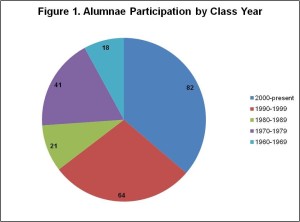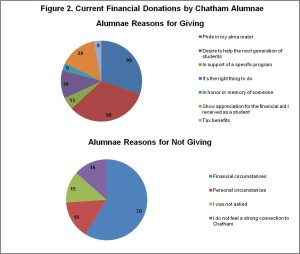Dear Esther – Part 9
Dear Esther,
You repeatedly stated at the townhall meetings that alumnae donations and participation have declined rapidly in recent years. In the Campus Community Presentation shared at the town halls and on the Chatham Feedback blog, the administration cites that, for 2013, 1525 (of 6000 total) alumnae financially donated to Chatham and that only 22.6% participated in College for Women events and opportunities.[1] However, you did not ask alumnae how the transition to a coeducational college would impact their giving and volunteering. Don’t worry, Dr. Barazzone, your World Ready Women collected and interpreted the data for you.
WHAT WE KNOW…
On March 26, the Philadelphia Chapter of CCW alumnae released a survey via social media and email requesting alumnae to provide information and opinions about CCW and the potential transition to coeducation. There were 231 alumnae who provided responses.[2]
Alumnae participation varied across class year, as shown in Figure 1. Given that the survey was only distributed electronically, there is a slight bias towards alumnae who have graduated more recently from CCW and a greater response from earlier generations of Chatham women would have been more effectively collected had the survey also been provided in hardcopy by mail.
Of those alumnae completing the survey, only one was unaware that the Board of Trustees is considering changing CCW to a coeducational college. When asked about their opinions of a transition to coeducation, 12.5% of respondents were in favor (n=29), 73.2% were opposed (n=169), and 14.3% were uncertain (n=33). While these numbers are limited only to the participants of this particular survey, the results suggest that a majority of alumnae are opposed to a transition to coeducation.
Perhaps the most relevant information collected on the survey relates to alumnae giving through financial donations and volunteer activities. While you have repeatedly said that not enough alumnae financially support the college as it is, these survey results show a nearly equal number of Chatham women who donate and do not donate. When asked if they currently contribute financially to CCW (n=227), 49% of alumnae answered yes (n=111) and 51% answered no (n=116). Alumnae reasons for giving or not giving at the present time are shown in Figure 2.
Alumnae were asked if CCW becomes a coeducational college, would they contribute financially to the coeducational college. Of the 229 respondents, 15.3% said yes (n=35), 62.4% responded no (n=143), and 22.3% were uncertain. This means that 76 of the 111 alumnae who currently give to CCW would either no longer donate financially or be uncertain about their future donations. If this trend were to hold true across the 6000 alumnae of CCW, this means that 3744 alumnae would take their seed corn elsewhere. If applied specifically to the 1525 cited in the Campus Community Presentation, over 1000 of your current alumnae donors would be unsure about donating to a coeducational Chatham or would not donate at all. How will you support any kind of undergraduate program with less than 500 alumnae donors?
You have also suggested that alumnae support in engagement, recruitment, and other activities has been limited. This is true – of the 229 respondents, only 47 alumnae currently participate in volunteer activities for Chatham College for Women, while 182 do not. However, when asked why alumnae do not volunteer, the overwhelming response was that, “I was not asked” (108 of 181 respondents). How much engagement can the administration expect from alumnae when you aren’t actively inviting them to support CCW, particularly those who are unable to donate financially at the present time?
Similar to the future giving responses, there is a clear decrease in the number of alumnae who would continue to volunteer. Of the 230 responses relating to participation in future volunteer activities at a coeducational college, 7% said yes, 62.6% said no, and 30.4% were uncertain. Across the entire CCW alumnae body, this trend would mean that only 420 alumnae around the world would commit to participating in volunteer activities at a coeducational Chatham.
WHAT WE BELIEVE…
Of those alumnae who participated in this survey, an overwhelming majority opposes the transition to a coeducational college. You may think there are just a small number of angry alumnae who repeated call, write, and express frustration with the lack of transparency – this is unsupported by real data.
Dr. Barazzone, in an interview with the Pittsburgh Post Gazette on February 18 [3], you stated, “”Our alumni love Chatham and will support Chatham after a period of being sad about this necessary change.” The data and statistics do not support your sentiment. A majority of alumnae will not simply forgive and forget, and more than 60% have already stated that they will no longer support Chatham, financially or otherwise.
WHAT WE WANT…
A delay of the Board of Trustees Vote.
Given the lack of opportunity for alumnae to increase their financial donations and participation in events and opportunities to support what we now know is a failing CCW, we believe the coed vote should be delayed by at least a year. In that time, we ask you and the administration to provide us with the following:
- A long-term fundraising goal, with restricted use on the funds solely for CCW, for alumnae in order to lessen the financial strain CCW has placed on the rest of the University.
- A detailed listing of recruitment events for alumnae to volunteer at to serve as a representative of CCW and the necessary support by the administration (e.g., informational materials) to carry out those activities.
- A comprehensive strategy for engaging alumnae of CCW, regardless of the coed decision, given that the administration has repeatedly ignored or diluted their questions and concerns regarding the coed vote.
You have asked for our feedback, Esther, but are you and the Board really listening? If so, you will take this letter to heart and act upon our requests.
Sincerely,
The Save Chatham Movement
[1] See PDF version of the Campus Community Presentation (pages 43-44): http://blogs.chatham.edu/chathamfeedback/2014/03/05/campus-community-presentation/
[2] The total number of responses used in the following data calculations may vary from the total 231 participants. Some questions allowed for multiple responses, and respondents were not required to answer every question.
Tags: alumnae, Board of Trustees, Chatham University, co-ed, engagement, Esther Barazzone, fundraising, Save Chatham, seedcorn, women's college



It would be nice to add in there wabash’s numbers….i believe mr. Newport said they were at 90% or so alumnae giving as a result of asking their alums for help when facing simular issues…you know to show ester what she could have
It seems simple to me. Tuition costs go up. Years to repay loans go up. Alumni giving goes down.
Chatham should be working toward providing the same quality education for a lower price. You know, the same issue every real business deals with every day.
http://www.mindingthecampus.com/originals/2014/04/the_liberal_arts_are_in_troubl.html
It isn’t too simple. Why would tuition go up? Demands for single-sex college decrease as gender inequality became more subtle than aggressive; high school girls do not see the need for coming to all girls’ school. Therefore, the mainstream of income goes down for Chatham when cost of living and necessary expenses increase, so tuition goes up. Furthermore, tuition increases every year for every college.
Chatham is considering coed because they want to provide same quality education for lower price and for more girls. The changing trend among consumers is the same issue every real business deals with every decade or so.
Alumni donations fund a lot of undergraduate scholarship account; however, the participation rate is still less than a quarter of all alumni.